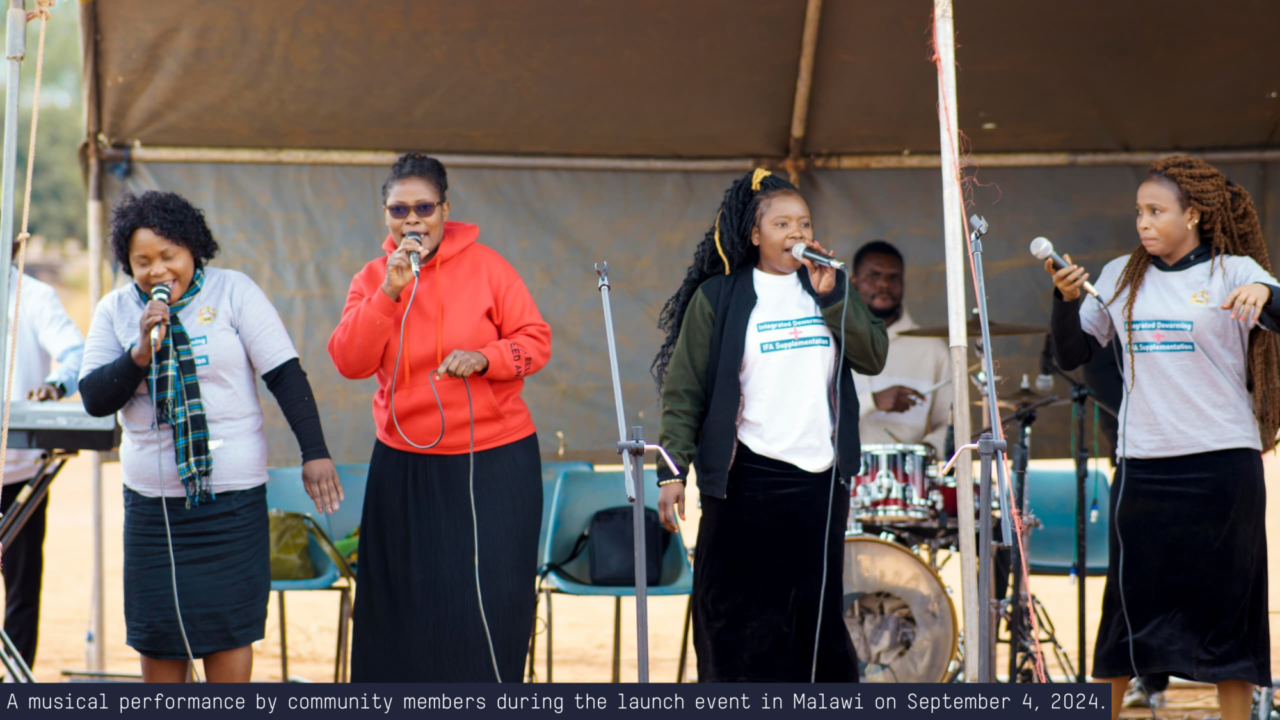Due to the risk of COVID-19, in most states the Government of India mandated the closure of schools and preschools from March 2020—closures which are still in place and are due to be lifted by November 16, 2021. To prevent the interruption of India’s National Deworming Day (NDD) program, which normally is delivered in schools, we worked with the government to adapt to a community-based model, first implemented in August 2020. Community-based delivery consists of frontline health workers—a mix of accredited social health activists (ASHA), auxiliary nurse midwives, and preschool and nursery workers, locally known as anganwadi workers—delivering treatment directly to children over several weeks either by going from house to house or at designated sites.
These frontline workers have been the lifeline of the NDD program and the COVID-19 response system in the country. Even before the pandemic, they were considered the backbone of India’s rural health system—providing a wide range of health services such as prenatal and postnatal care for pregnant women, immunization drives for children, and population screening for disease surveillance. When the COVID-19 pandemic began, they also became responsible for conducting awareness campaigns, screening returning migrants, conducting contact tracing, and facilitating access to COVID-19 diagnostic and treatment services.
One of the main challenges to implementing community-based deworming was to train over one million of these frontline workers rapidly and effectively, while maintaining COVID-19 safety protocols. As a technical assistance partner, we support the government to design training materials and build training cascades—wherein we train the instructors who will then teach others. Under a school-based deworming model, the ultimate training recipients usually are teachers, many of whom have delivered the treatment in previous years. However, with the change in delivery, a significant portion of the frontline workers were receiving training for the first time on how to deliver the deworming treatment, during a period when they have significant additional duties and no time to spare.
In order to adhere to the COVID-19 safety protocols established by the Government of India and ensure minimal in-person interaction, our team digitized the existing NDD training toolkit, leveraging existing digital platforms to rapidly and effectively deliver the materials to all the actors involved in the program. The digital toolkit included the following content:
- Training presentations for local government officials in their regional languages covering drug distribution, adverse event management, community mobilization, and monitoring and evaluation.
- An animated video created for frontline workers for administering deworming treatment, following COVID-19 safety guidelines. The video was made in English and Hindi and later translated into Bengali, Kannada, and Telugu.
- Thirteen visuals in English and Hindi with practical guidance on the roles and responsibilities of frontline workers. The visuals were optimized to be shared on Whatsapp.
- A social media package in English and Hindi that included short videos, GIFs, infographics, human interest stories, and images to promote awareness of the deworming campaign and the COVID-19 prevention measures that were taken by the government.
- A guidance note for parents published on school websites that described the new program strategy and their roles and responsibilities during the frontline worker’s home visit. The notes were published in English and Hindi.
- Training handouts for frontline workers conducting door-to-door treatments, produced in Bengali, English, Hindi, Kannada, and Telugu.
- A Google form to track and monitor the training of frontline workers. It was used to identify potential gaps and communicate them to the government for a rapid corrective response.

Several of the digital training materials were designed to be shared and consumed using WhatsApp, which has been an integral part of the deworming drive in India even before the onset of COVID-19. The content was shared in WhatsApp groups created by state governments to promote collaboration and support field coordination between local government officials and frontline workers. These groups are widely used by frontline workers, making them an effective vehicle to deliver the training materials.
To validate that frontline workers and local government officials received the appropriate training and necessary resources to deliver treatment, we conducted phone calls to each of the frontline workers and local government officials to assess program preparedness. The calls were made three weeks before deworming, during implementation, and after the deworming round concluded. The purpose of the first two calls was to identify any gaps or problems, which were then communicated in detail to the relevant state government so they could rapidly conduct corrective action. The last call was to reinforce that the reports filed regarding the number of children that were covered by frontline workers were properly submitted to the state government. An additional round of calls was conducted to a random sample of parents who were contacted to confirm whether their children had received the treatment, in order to validate that the number of reported children who received treatment was accurate.
A few state governments developed additional innovations to improve the delivery of the deworming program. In Haryana, for instance, the state government incorporated NDD awareness and training materials on government-led digital platforms such as the ANMOL app, which frontline workers use to access and update patient records, and EDUSAT, a dedicated distance-education satellite service which provides virtual classrooms for rural and difficult-to-reach settings. The content shared in EDUSAT consisted of short awareness videos targeted to parents and students to highlight the importance of deworming and the role of parents during the frontline worker’s visit to their house. These videos were aired multiple times each day during breaks from online teaching sessions, from one week prior to the deworming round and continuing until the last day of the campaign. According to EDUSAT officials, approximately 2.1 million children enrolled in more than 10,000 government schools in Haryana watched the videos. For Narender Jangra, our State Program Manager in Haryana: “Digitizing the materials was critical to deliver the desired large-scale impact. It not only was cost-effective, but provided the government with the flexibility to adapt the content to the local context to improve the delivery.”
While COVID-19 has presented significant challenges to the operations of the deworming program in India, the creativity of our staff, the commitment of frontline workers, and the resilience and adaptability of the national and state governments of India have made it possible to continue providing deworming to millions of children. The most recent round of deworming is currently wrapping up, having taken place between August-October 2021 in 10 states with a target of 205 million children. For the next deworming cycle, with schools announced to reopen on November 16, 2021, we expect the NDD program will return to a school-based delivery model. However, we fully intend to take advantage of lessons learned from this experience and continue to implement some of these digital innovations for future deworming rounds.



